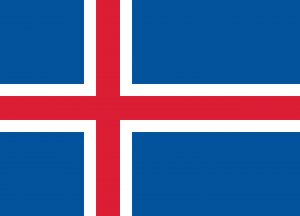Language/Icelandic/Culture/Icelandic-Holidays
| ◀️ Seasons and Months — Previous Lesson | Next Lesson — Icelandic Music and Literature ▶️ |
Iceland is a country with rich traditions and colorful celebrations that reflect its unique cultural heritage. In this lesson, you will learn about the most important holidays celebrated in Iceland, including their customs, traditions, and associated vocabulary.
Iceland's National Holidays
Iceland celebrates three national holidays each year:
Independence Day (Sjálfstæðisdagur)
Iceland's Independence Day commemorates the country's declaration of independence from Denmark in 1944. It is celebrated on June 17th each year.
On this day, Icelanders engage in a variety of activities, including parades, concerts, and fireworks displays. There are also traditional Icelandic foods like hot dogs, pönnukökur (thin pancakes), and bóndasúpa (meat and vegetable soup).
Here are some important vocabulary words related to Independence Day:
| Icelandic | Pronunciation | English |
|---|---|---|
| Sjálfstæðisdagur | [ˈscaulvstaith-iss-dah-gur] | Independence Day |
| Pönnukökur | [ˈpœt-nʏ-kœh-kʏr] | Thin pancakes |
| Bóndasúpa | [ˈboʊnta-ˌsu-pa] | Meat and vegetable soup |
Christmas (Jól)
Christmas is a big celebration in Iceland that lasts for 26 days, from December 11th to January 6th. One of the unique Christmas traditions in Iceland is the 13 Yule Lads, who are mischievous characters resembling Santa Claus. Each Yule Lad arrives on a different day before Christmas and leaves small gifts or pranks for children.
Another popular Christmas tradition in Iceland is the Christmas book flood. Icelanders give books as gifts on Christmas Eve, and then spend the evening reading while enjoying hot chocolate and a type of twisted bread called laufabrauð.
Here are some important vocabulary words related to Christmas:
| Icelandic | Pronunciation | English |
|---|---|---|
| Jól | [joːul] | Christmas |
| Yule Lads | [jʏːlɛtlar] | The 13 mischievous characters of Icelandic folklore |
| Laufabrauð | [løivaprcuːð] | Leaf bread |
First Day of Summer (Sumardagurinn fyrsti)
The First Day of Summer in Iceland is celebrated on the first Thursday after April 18th each year. It is a national holiday that marks the beginning of the summer season in Iceland. Despite the name, the weather is often still quite cold on this day.
On the First Day of Summer, Icelanders participate in a variety of outdoor activities, such as hiking, fishing, and camping. It is also common to eat ice cream and hot dogs on this day, which are popular Icelandic snacks.
Here are some important vocabulary words related to the First Day of Summer:
| Icelandic | Pronunciation | English |
|---|---|---|
| Sumardagurinn fyrsti | [ˈsuːmar-da-gur-inn ˈfɪr-stɪ] | First Day of Summer |
| Ísbjörninn | [iːs-byːr-nɪn] | The Ice Bear, a popular Icelandic ice cream chain |
| Pylsur | [ˈpɪl-sʏr] | Hot dogs |
Religious and Cultural Holidays
In addition to Iceland's national holidays, there are also many religious and cultural holidays celebrated throughout the year.
Easter (Páskar)
Easter is an important Christian holiday celebrated in Iceland. As with many other countries, Easter in Iceland is a time for family gatherings and feasting. One traditional Icelandic Easter food is a type of lamb soup called páskaflórsúpa.
Another unique Easter tradition in Iceland is the "Easter Egg Climb" where children climb a hill to collect chocolate eggs. It is believed that the tradition originated from pagan rituals associated with the arrival of spring.
Here are some important vocabulary words related to Easter:
| Icelandic | Pronunciation | English |
|---|---|---|
| Páskar | [ˈpaːskar] | Easter |
| Páskaflórsúpa | [ˈpaws-ka-flouːr-su-pa] | Lamb soup |
| Klettaleit | [ˈkʰlɛt-ˌlajt] | Easter Egg Climb |
Þorrablót
Þorrablót is a traditional Icelandic midwinter festival that celebrates the Nordic winter season. It is usually celebrated during the month of Þorri (January to February), and involves feasting on a variety of traditional Icelandic foods such as hákarl (fermented shark), svið (boiled sheep's head), and hálfgerður hrútspungur (half-cured ram testicles).
Here are some important vocabulary words related to Þorrablót:
| Icelandic | Pronunciation | English |
|---|---|---|
| Þorrabrót | [θɔra.braut] | Þorri Festival |
| Hákarl | [ˈhauː.kartɬ] | Fermented shark |
| Svið | [svɪːð] | Boiled sheep's head |
| Hálfgerður hrútspungur | [ˈhauːlv.ɡɛrðʏr ˈr̥uːts.pʏn.ɣʏr] | Half-cured ram testicles |
Summer Solstice (Jónsmessa)
Jónsmessa is a midsummer celebration in Iceland that takes place on June 24th. It is believed to be a night of mystical powers and magical happenings. Many Icelanders attend bonfires, where they sing and dance the night away.
Another interesting tradition on Jónsmessa is the practice of rolling naked in the morning dew, which is believed to have healing powers.
Here are some important vocabulary words related to Jónsmessa:
| Icelandic | Pronunciation | English |
|---|---|---|
| Jónsmessa | [ˈjoːns.mɛsːa] | Summer Solstice |
| Bónfestar | [ˈboʊn.fɛs.tʰar] | Bonfires |
| Rigningarkarl | [ˈrɪŋ.nɪŋ.ar.kartɬ] | Morning Dew Man |
Conclusion
Icelandic holidays are full of unique traditions and cultural practices that reflect the country's rich history and heritage. By learning Icelandic holiday vocabulary, you will gain a deeper appreciation for Icelandic culture and the customs that make it so special.
Other Lessons
- People
- Dialects
- History
- Names
- Djammið How to Party in Reykjavík
- Religion
- Iceland Timeline
- Icelandic Music and Literature
- Literature and Arts
Sources
- Icelandic Holidays, Celebrations & Traditions - All Things Iceland
- 9 Intriguing Icelandic Traditions — Acanela Expeditions
| ◀️ Seasons and Months — Previous Lesson | Next Lesson — Icelandic Music and Literature ▶️ |

